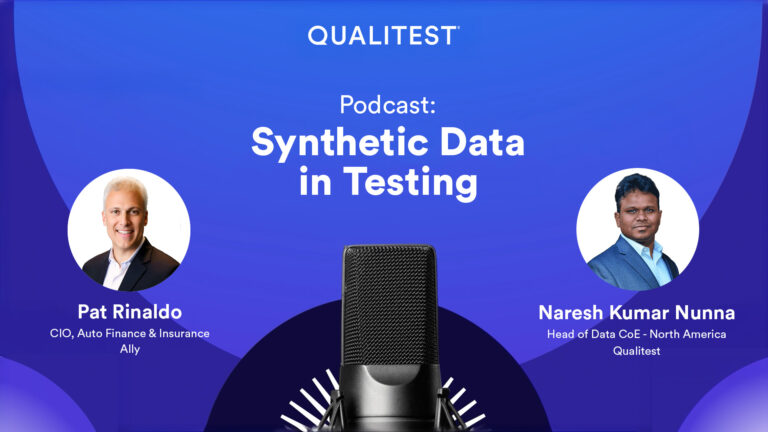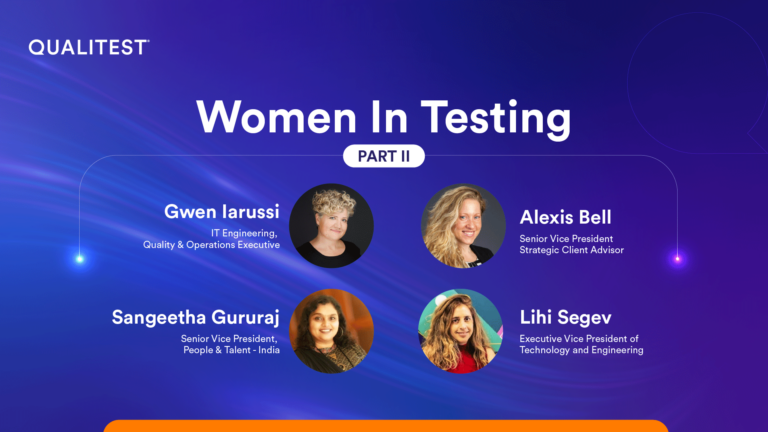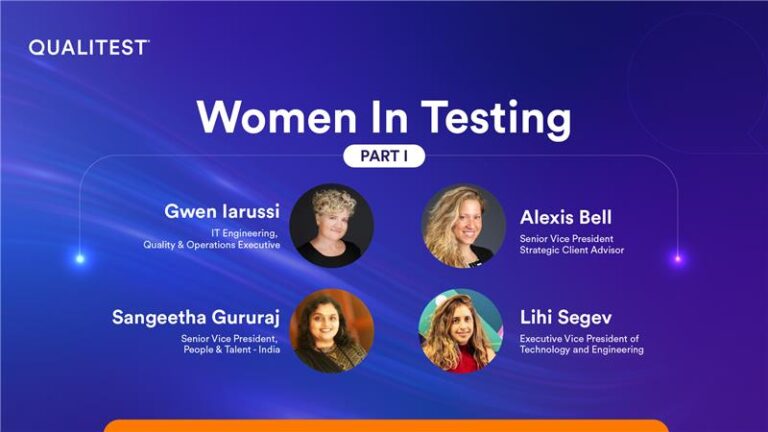
Panelists


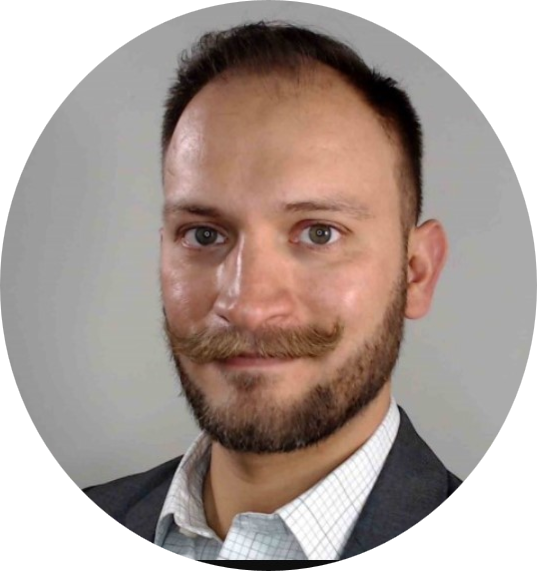
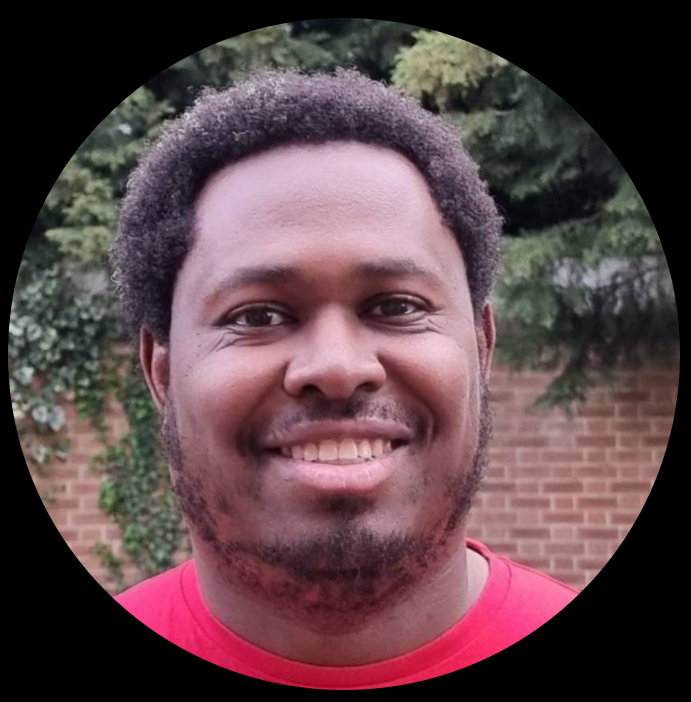
When it comes to Software Testing, there is no guarantee that what a tester is doing today will resemble what they are doing five or ten years from now, or if they will still be involved in software testing. Many people come and go, while others make it a point to be “lifers” in the software testing industry. Still, even for the so-called lifers, there is a broad array of options and opportunities for career growth and development. Where to go and how to get there are the broader questions.
Michael Larsen sits down and talks with Vernon Richards and Leandro Melendez at the Pacific Northwest Software Quality Conference (PNSQC). held in Portland, Oregon, USA in October, 2022. They discuss the challenges and opportunities available to software testers, as well as the responsibility of curating their own testing careers, both in the work they are doing now and the work they might want to do going forward.
References
- Being Glue | Tanya Reilly | athenahealth Tech Talk
- The economics behind ‘quiet quitting’ — and what we should call it instead
- The Alchemist by Paulo Coelho
- Señor Performo (YouTube, Spanish)
- Señor Performo (YouTube, English)
Transcript
Michael Larsen (INTRO):
Hello, and welcome to The Testing Show.
Episode 127.
Curating Your Testing Career
This show was recorded live on Monday, October 10, 2022, and it was recorded live at the Pacific Northwest Software Quality Conference. In this episode, Vernon Richards and Leandro Melendez talk with Michael Larsen about the challenges and opportunities that come with forging a path in the software testing space, making career choices, and taking advantage of opportunities that can lead to new career vistas. This was recored on the floor of the conference, so there is active participant noise in the background, just as a heads up.
And with that, on with the show.
Michael Larsen (00:00):
Okay, we’re trying a little bit of an experiment right here. I am in the middle of a table at PNSQC 2022. We are at a totally different location, so everything that we’re doing is kind of flying by the seat of our pants. But it’s always exciting because we have some very memorable and familiar voices here, especially if you’ve been around the software testing world for a while. Around the table right now, I would like to welcome Vernon Richards.
Vernon Richards (00:26):
Greeting. Hello
Michael Larsen (00:28):
And Leandro Melendez.
Leandro Melendez (00:31):
Hola, everybody. It’s a pleasure to be back. <laugh>.
Michael Larsen (00:35):
So one of the things that’s really interesting about today, not just the fact that we are in a location that is different, but it has been three years since PNSQC has been able to meet in person. We’re dealing with all the after-effects of that. I’m not going to say that the pandemic is over, but it is nice to see something vaguely resembling normal coming upon us. But many of us flew from… in Vernon’s case quite a distance away, <laugh>. So first off, welcome and what prompted you or who reached out to you to come and participate?
Vernon Richards (01:10):
It was Tariq [King] actually. We were in Chicago in June and we were both presenting at Agile Testing Days and we just got chatting. We hit it off and then he was like saying, “Hey, I’m part of the committee for PNSQC. You should come along”… and this, that, and the other. So we just got on talking and one thing led to another and here I am in the wonderful Pacific Northwest. So this is very, very cool. I think I will be back.
Michael Larsen (01:38):
I’m happy to hear that. I really enjoyed your talk and I had a chance to live blog a bit about it and your conversation and your keynote that you were talking about was the whole idea of “Curating a Tester’s Career”. Cause that’s how I’m phrasing it. You…
Vernon Richards (01:53):
Yeah, I love that.
Michael Larsen (01:53):
Verbed it differently.
Vernon Richards (01:54):
Yeah.
Michael Larsen (01:55):
But we are the ones responsible for curating our careers. We cannot expect that our managers are going to do it. We cannot expect that our peers are gonna help us do it. And in some cases, well to borrow a lyric from Roland Orzabel [Tears for Fears], “nothing really changes unless there’s some pain” <laugh>.
Vernon Richards (02:15):
Yeah! Yeah, indeed.
Michael Larsen (02:16):
And you emphasize that as well, that, for many of us, if we want to make advances or make changes in our career, we’re going to have to go through periods that might not be terribly pleasant.
Vernon Richards (02:29):
I think that’s because in order to affect the change, it’s gonna require some effort. Something is gonna have to be different and it’s gonna take a long time for you to get the result or the outcome that you are aiming for. And that is effortful. That is difficult. It may not be a straight line, so it may not be just, “Well, I’m here, and I want to get there”. And it’s just a straight line from A to B. You could be going zigzagging all over the place going forward, one step forward, two steps back, all these kinds of things. The process itself is difficult, let alone the pain that may be urging you to move in the first place. There’s probably gonna be some pain and or some effort involved in that whole situation, I would say.
Michael Larsen (03:14):
I was really thinking about this from the perspective of we, I think, know people who said, “Well, I’m a software tester and I’m happy to be a software tester, and I’m just a tester”. And yet I’ve thought about it from the perspective of my career and I’ve never been allowed to just be a tester. In some ways by virtue of being a software tester. And by virtue of having that role, it’s almost giving implicit permission to anybody in any company to say, “Hi, I am a jack of all trades. Throw me where you want to”
Vernon Richards (03:52):
Yeah, that is <laugh>. Yeah, I’ve been thinking… it’s funny, I’ve been thinking a lot and that’s because I found this talk… I’m gonna get her name wrong. I think her name is Tanya Riley, which she did a talk at lead dev about glue work. And glue work is that work that kind of happens under the radar, but if it doesn’t happen, nothing good happens. It’s the kind of thing where, “Oh, this person is not talking to that person. If they talk, all these subset of problems disappear and vanish or the requirements of this piece of work, they suck. So we need to make them better. Who’s gonna organize that?” That’s glue work. Some of the characteristics of glue work are that it goes unrewarded and it’s outside of the job description of the person doing it. Then there’s this other concept of “quiet quitting”, which has come into the public discourse since “the event”. “The plague”, shall we say.
(04:49):
And that’s the situation where people are like, “You know what? I’m busting my tail at work and I’m not seeing the reward, so I’m just gonna hang back and I’m gonna stick to literally what it says in my job description.” That’s been labeled as quiet quitting. And then here we come as quality engineers, testers, quality coaches, basically saying, “we have to be everywhere in the process because quality spans everything”, which is true. Here’s the problem, like Michael just said, when you say you’re a tester, you can get thrown in anywhere or anything. And so what it says in your job description may not be the thing that needs doing right now. And as a tester, generally speaking, we are really good at looking at things holistically and then deciding, “Ah, we need to go and do X, Y, and Z.” I think there’s an interplay between those two things that I want to explore more and research move. Cause I think you’re right, we are the best place to do that stuff, but sometimes it can have some negative consequences if we don’t manage it properly.
Michael Larsen (05:49):
Absolutely. One of the areas that I laughed about and I thought about from your talk because as you were describing it, the fact that we were able to very often, using the glue work as an example, this is a phrase that reminded me from back in my earlier musical career. I was a musician prior to being in software test. And I tell people a lot of the time that my experiences being a musician gave me a masterclass level education, if you will, about how to be a software tester because you had mentioned this whole bit about glue work. And this was a phrase that was applied to me by my guitar player, Carlos, and early on I wasn’t sure how to take it, but now I really appreciate it, especially from the perspective of software testing. When he had described what my role in the band was, he said, “Yes, I get it.
(06:44):
You’re the singer. That’s not really what your role in the band is. That’s your role as a performer and that’s your role as High Wire on stage and recording. Your role in the band, though”, (that he pointed out to me, he says), “Whether you’re gonna take this as a compliment or something else is not for me to say, but you are without question the psychic glue of this group.” And I had to think about that for a while. I said, “What exactly does that mean?” And what he meant by it was, you are the individual that through whatever, whether it’s your personality or your willingness to solve problems or your just ability to roll with the punches, you are able to take disparate people who, if left to their own devices, would not get along with each other <laugh>. And you’re willing to put yourself in the middle of it and say, “There seems to be a problem here.
(07:41):
How can I help?” And that’s a phrase I’ve used many times over the years is “There seems to be a problem. How can I help?” Either I’m a glutton for punishment, <laugh> or I like the variety, I like to solve problems, I like to see people get along and I like to move forward and whatever that takes. And if, okay, that’s not quite my job description, but it’s not anybody’s. So… yeah, let’s see what happens.
Vernon Richards (08:09):
Yeah!
Michael Larsen (08:09):
Either I can say, “This is a cool thing to do” or I can say, This might be fun. Who knows?” And more times than not, that’s where I find myself, “Hey, we need somebody who can do a tiger testing rapid response because of our customers running into a problem here. Michael, can you get on a plane and fly to Nashville <laugh> and go into the wiring closet over here and help us figure out what’s going on with this content delivery network?”
(08:36):
Sure, I can do that. I don’t know if I’ll be successful, but I’m willing to try.
Vernon Richards (08:41):
Yeah.
Michael Larsen (08:42):
Somebody said, “Hey, we want to explore some options for doing Accessibility. We don’t have anybody who is on our team who really knows that, would you be willing to take this on? Ten years ago, I said, “I don’t really know much about it. Sure.” And what do you know about me now is that’s my main bread and butter when I come and talk to conferences. But it wouldn’t have happened had somebody not said, “We don’t have somebody to do this. Are you willing to?”
Vernon Richards (09:11):
That… I was just checking. It is Tanya Riley, she is awesome. Her Twitter handle is @WhereIsTanya? Go check her out. So the point that Tanya made in her talk about glue work is if you don’t articulate what you do well enough when it comes to your career progression conversations, your promotion conversations, nothing that you did is tangible or even perceivable to the business. I’m generalizing it. And so you have to be quite careful about taking on these opportunities. And they are opportunities without getting the recognition or the reward if that’s what’s important to you. If you’re just like, “Well, I’ll just take the skill, I’ll take the experience and I can parlay that into something tangible later”. That’s fine. But if people are looking at you kind of saying, “Well Mike, you were employed as a tester. You’ve done no testing, you’ve been in this damn, you’ve been in this damn cupboard pissing around with these wires and figuring out CDNs, that’s not your job.”
(10:18):
<laugh>. You’d be like, “Yeah, but if I didn’t do that, the whole project would’ve failed. Our number one customer would’ve bailed…” that rhymed, by the way, <laugh> pause…. Okay, that’s the thing to be mindful of. And it’s like there’s a balance or a trade off to be made there. I mean, one of the solutions could be to work at a place where that kind of thing isn’t a negative, it’s not frowned upon that you are pitching in where the need is. The reason why that struck with me is cuz I’ve been in a situation where I’m brought onto a team to help with testing. They want me to interact with the product and look for problems. I’m like, “Cool, I can do that.” And I joined and I suddenly realized, “Wait a minute, if we change how we collaborate over here, it will mean that I actually have to look for less problems.
(11:04):
There’ll just be less problems in the product. So I’ll start advocating for that.” People are like, “Hey bud, why are you poking around over there? You shouldn’t be poking around over there. We just want you to sit here and interact with the product and look for bugs. That’s what we want you to do.” And it’s like, “Well, yeah, but that’s not where the value is.” The example I always use is it’s like getting in a plumber and you are saying, “Well the leak, we’ve got some damage in our ceiling in this corner of the room.” And the plumber’s like, “Oh, well that’s because the leak is in the opposite corner and it’s just running around whatever buttress, and the damage is over there. But the problem is over here.” And they’re like, “I don’t wanna hear about what the problem is over there. I want you to fix the damn leak over here”. But that’s not the… what do you mean?!”
Leandro Melendez (11:43):
Following with that example at times is you just fix this side that seems to be broken but you don’t pay attention to…
Vernon Richards (11:49):
The underlying <laugh>.
Leandro Melendez (11:51):
The rest. Exactly. You have the same problem.
Vernon Richards (11:54):
Exactly. I think there’s some interesting stuff going on there. I think people like Michael and me to some degree, one of our strengths when it comes to software testing is our ability to step back and see the whole and kind of say, “Oh well actually because I’m just a generalist or I’m not scared of tackling weird or wonderful new things, I don’t mind going and doing X, Y, and Z.” But for some people that can have some negative consequences. I’ve experienced that. I think we need to talk more about that, actually.
Leandro Melendez (12:25):
That is a very good point. When you start to scout into different areas or things that you may be good at, may be really interesting. And probably the organization doesn’t recognize or want you dealing, or touching that. That’s good for you because eventually, you’ll end up with that. Find a place where you can get that fun.
Vernon Richards (12:45):
Exactly.
Leandro Melendez (12:45):
And of course, you will grow over there and hidden skills that you will foster and develop further. Who knows? It’s your passion, your new career, right?
Vernon Richards (12:54):
Yeah. I’ve described this to a bunch of people like this. I’ve got a few friends (and more and more people are doing this) who, they cared so much about quality and testing that they’re no longer testers. <laugh>. Think about that. They cared so much about quality and testing, but they were like, “Actually I can impact those things more by not being a tester, but by being an SRE. By being an engineering manager, by being a head of engineering, a CTO, et cetera, et cetera, et cetera.
Leandro Melendez (13:30):
Speaking at conferences about quality <laugh>.
Vernon Richards (13:33):
Yeah, because for now, testers and quality folks don’t necessarily have access to the levers. And so these people are like, “Well how do I get access to the levers? Oh, if I’m this kind of role or that kind of role, then I can do that.” Somebody like Michael because he will just go and investigate things and get thrown in the deep end. Okay, I’m the person who’s gonna pull that thing and impact the quality more broadly.
Michael Larsen (13:58):
I’ve had my moments <laugh>.
Vernon Richards (13:59):
Yeah, I’m sure. It’s that kind of, I want to kind of explore the interplay of all those things. Cause I think it’s worth talking about. Quality engineers and testers are asked to do that work, but then at the same time it’s almost we get pushback for doing that work. What is all that about? Cause it needs doing and/or it’s helpful. What needs to be different about that whole situation to eliminate the pushback or have the work valued?
Michael Larsen (14:27):
So on this point, the key here is curating your career. So let’s say you have somebody who’s relatively young in the testing world, maybe just a couple of years, maybe they’ve primarily just focused on manual testing, but they’re like, “Where do I want to go next?” If you were going to counsel, say a young 20-something tester or older, I’m not trying to be ageist here, but let’s face it, somebody who first gets into the field and they’ve done testing for a bit <affirmative> and they’ve reached that stage of there must be more to life than this <laugh>. Yeah. What avenues or what things would you counsel somebody who’s having that conversation?
Vernon Richards (15:08):
Probably coach them through it. I mean from the perspective of being very non-directive, but asking them open questions to help them gain some insight on their own situation so that actually they can answer their own question. I would be asking them things like, “What makes you want to do something different? Where are the frustrations in what you are doing? What are the things that you really enjoy and you’d like to get better at?” And just explore what’s going on for them right now so that they can understand what it is that they’re unhappy about or so that they can understand what’s the opportunity that they’re trying to take advantage of or leverage or create. And then it’s a matter of what’s the next step that you can take in that direction. My first port of call wouldn’t be to tell people stuff. It would be to kind of help them explore the space and then if it made sense, if I had some suggestions or some insights, I would try and offer those into the conversation.
Leandro Melendez (16:07):
It’s kinda tough for what you’re saying cause I would see a mix as well. One very good, as you say, the reasons for looking for different grounds, but at the same time, QA is so vast.
Vernon Richards (16:18):
Exactly.
Leandro Melendez (16:19):
Different and feeds so many personalities, learning styles, and likes or dislikes. I think that’s a very good way and guidance coaching. “Okay, I see your personality on this side. I don’t see you here or there.” You reminded me quickly of a coworker that was super excited of becoming a manager and as much as I tried, like, “You don’t have manager material, you will suffer through it. Really? Do you wanna go there, try something else? There are so many cool things in QA.” That guidance… he eventually ended up going trying it and struggled big time. And we know people that… you, with the experience, you have been places, you have been in projects as well as you Michael, you have the feeling and you can quickly tell like, “Hey, I think you will be good here or why don’t you try this or that. Mentorship, I think, that’s a very good big step, right on those career or…
Vernon Richards (17:09):
Yeah. Having mentors and even more powerfully, sponsors, that can really be a career boost. But to come back to the question, what I would do to build on what Leandro said, the space is so massive. “I’ve seen people with your strengths and attributes do very well doing X, Y and Z. And here’s how those strengths played into their success. Maybe you could do that”, and just give people options. Cause the other thing is if they’re new to a field, they may not even know what’s possible. So at the appropriate time to kind of share what’s possible for people, it can be massive just letting people know, “You’re gonna hear some static and some flack about testing and how that’s the bottom of the food chain. But actually, you can leverage that into X, Y, and Z situation and really come out ahead.”
Leandro Melendez (17:55):
Out of what you mentioned. What would be the difference between a mentor and a sponsor?
Vernon Richards (17:59):
So if you use the analogy of, “I’m trying to achieve something in a career and I need to get through that door.” So a mentor can share with you, “Oh here’s how I got through a similar door. I use this lock pick with this particular lock and I got through it. Whereas a sponsor just gets some dynamite and destroys the door <laugh> and then shoves you through the door.
Michael Larsen (18:21):
That is a good way to look at it. For anybody who’s familiar with the podcast, you know that I have mentioned the name Ken Pier a number of times. Ken passed away back in 2015 and Ken was a huge influence on a particular part and time in my career when I was at a crossroads, to be honest. Looking for my next thing and I just posted to a group of friends saying, “I guess I’m probably gonna’ have to start looking for a new position pretty soon.” Ken was the first one who reached out to me and says, “You’re available? Hey, do X, Y and Z. I need this from you. Can you get it to me by tomorrow?” “Yeah, sure.” “Great. Hey, what would you think about coming down to have a quick dinner sometime? Would you be cool to come down to Palo Alto?” “Sure, yeah.” “Okay.
(19:06):
Hey, while I’m here, my vice president of my company happens to be here and somebody we just recently hired to work in the testing team is gonna be here. Mind just sitting down chatting with us for a bit?” So in a way, not so much that he was sponsoring me through, but he was basically saying, “I have an idea. I know how I can make this work. I have pull. I have faith in you. Just trust me on this.” And that was hugely helpful. He didn’t stop and say, “I’m not going to help you. You’re gonna have to just figure this out and good luck to you. If I have something that can smooth the way I’m gonna smooth the way I’m going to remove the blockers. I’m gonna get the BS out of your way so you can be effective. And once I figure out where your effectiveness lies, then I’m going to encourage even more of that.”
(19:52):
It’s how I got into the Accessibility space. It was literally, “We need somebody to deal with this, and right now, I don’t have the bandwidth for it. Patty doesn’t have the bandwidth for it. Can I count on you to do this?” And through that process, “Oh, this was rather cool.” And I learned quite a bit from it. He opened up an advocacy avenue for me that I didn’t realize I wanted to be part of, to begin with. And then once that got a bite and I realized, “Oh there’s an entire community of people that in our software world is underrepresented and needs more voices.” That was exciting and it made me go, “I want to work with this. I wanna be part of this”. Again, bringing this back to the curation of your career, you might find that a happenstance conversation or a side assignment that maybe wasn’t intended to be a long-term thing can have that happen. I call these hinge-pin moments. Like a door opens.
Vernon Richards (20:58):
Yeah, a hundred percent.
Michael Larsen (20:58):
And a hinge moves a certain way and your path goes that direction. And what I like to see in testing and I think this rolls this well, is as software testers, we are able to move those hinges in a variety of ways cuz there’s so many positions that we can apply our skills.
Vernon Richards (21:17):
Exactly.
Michael Larsen (21:18):
We’re not just programmers, we’re not just people who test. We can touch on any number of things.
Vernon Richards (21:25):
Yeah, totally agree.
Leandro Melendez (21:27):
It’s awesome how you mentioned that you got, as you say was a half mentor but more enabling you. I would say it sounded a little bit almost luring you into something that had feeling like, “He’ll fit there, I’m gonna put breadcrumbs in front of him towards this way. And you didn’t went for the breadcrumbs but the whole loaf of bread that you got it. And it’s funny how people can see that and guide you a little bit, put it in front of you and are awesome changes in life, changes in perspective. Probably from a wish that you had. As you said in your talk, I’m looking for something and some others have been there. I know some friends that suddenly… which of you ended up in testing by accident?
Michael Larsen (22:15):
Oh yeah. <laugh>,
Leandro Melendez (22:16):
Right? I mean, were you assigned to a testing project suddenly?
Vernon Richards (22:21):
Me? You know what I realized? I thought I’d end up here by accident, but I didn’t actually. But I didn’t anticipate I would stay.
Leandro Melendez (22:28):
Okay.
Vernon Richards (22:28):
So my original plan was to be a games designer and a typical route into that is games testing. So I deliberately a games tester, but then when I found out, so the games for the folks watching games testing, you in private industry, I dunno, working at an eCommerce company, whatever. And you think you are the bottom of the food chain. Go test at a games company, you will know what that means. It’s like they could find someone to do this. Literally they could just cattle hook somebody off the street to come and do the job. When I got hired, it was cause of my customer service experience. So it’s like okay, we’ve got this opening in the customer service department, can you come and help us? And then when they had an opening in a test team, it was like, “Oh, well, you know the games and how to support these games. So you should just come across and actually test them.”
Leandro Melendez (23:22):
What I think connects to what you’re saying and it’s gonna be an Agile paen or very relevant to nowadays, you were able to switch hats. You were a T-shaped person, big time, and that’s what helped you and what allowed you to stick around and to improve your career to get a hold on it. I don’t know, Vernon, you got me thinking, you didn’t want to be a tester. You were into video games, right?
Vernon Richards (23:51):
I wanted to be a tester, but that was an interim step <laugh>
Leandro Melendez (23:55):
to get to video games/ right?
Vernon Richards (23:57):
Yeah.
Leandro Melendez (23:58):
So I’m not sure, made me kind of reframe my mindset. Cause you lift your hand tested by accident. Yeah, sure. That happened to me too. Manager like, Hey you know this, can you test this? Yeah yeah. <laugh> exactly as you and you’re the very first one. No, I saw testing. It was about something that I’m interested, but we went into it. But it’s funny how many of us are just thrown into it because we have other skills.
Vernon Richards (24:25):
Exactly.
Leandro Melendez (24:26):
That are very useful in testing, in QA, and all the beautiful umbrella of activities that we can do. And I think I take a lot when, from what you’re saying, Michael, get those extra skills and you have no idea how many other things you will be able to reap out of it <laugh>
Vernon Richards (24:44):
It’sifficult to predict. This is the thing about curating your career on one hand, being clear about the direction that you are headed in and the outcome that you are looking for, I think is helpful and important. But the same time you need to be open to the opportunities that will present themselves. What is the name of that book?
(25:10):
Is it Paulo Coelho?
Leandro Melendez (25:12):
Paulo Coelho?
Vernon Richards (25:12):
Yeah. What’s the book that the…
Michael Larsen (25:14):
The guy behind “The Alchemist”?
Vernon Richards (25:15):
Alchemist. The Alchemist. There’s a passage in The Alchemist. I’m gonna butcher this story, but it’s basically the story of this, I dunno if it’s the main protagonist in the book. He ends up in some palace and the ruler of this thing gives him this spoon with some water in and tells him to go and have a look around the palace and report back what he sees. And he comes back and he reports back what he sees. And he says, “Yeah, but what about the water in the spoon?” And he’s spilled all the water in the spoon cause he was too busy paying attention. And he says, “Right, you gotta go. Here’s some more water. Go and do it again, but make sure you don’t spill any water. Go on, explore this part of the palace. Tell me what you see.” And he comes back, he goes, “What do you see?” And he’s like, “Well I have no idea, but I’ve still got all the water!” <laugh>. Cause I was focusing on the water. And I think the moral of it was you need to be able to go and pay attention to your surroundings without losing track of how much water you’ve got in the spoon. I’ve almost certainly butchered that. Please, go read the book <laugh>. It’s awesome.
Michael Larsen (26:11):
I like that. That’s great
Vernon Richards (26:12):
That’s… that’s what you’re trying to do with your career. You’re trying to be intentional and
Leandro Melendez (26:18):
Accept your opportunity.
Vernon Richards (26:20):
Yes. Opportunist at the same time, and flexible.
Michael Larsen (26:24):
Love it. Okay, so I want to use this time to kind of wrap up here since I am talking to two pretty well-known people, but just in case somebody’s listening here going, “Who’s Vernon? Who is Señor Performo?” How can we find out more about you?
Vernon Richards (26:39):
Well, you can find me on Twitter. My Twitter handle is “TesterFromLeic. L-E-I-C is an abbreviation for “Leicester”. So it’s “Tester from Lester”. You can find me on LinkedIn as well. Vernon Richards. I blog at type share. So typeshare.co/VernonRichards, no spaces in between Vernon Richards. You can find my posts there. And I’ve got talks on YouTube from all these various conferences and stuff. So hit me up in those places whenever you want.
Michael Larsen (27:11):
Fantastic. And Leandro?
Leandro Melendez (27:13):
My turn? Okay. I’m Leandro Melendez, also known as Señor Performo, an advocate with Grafana K6. For everone that’s watching, probably you can see me on LinkedIn, YouTube, Instagram, Twitter, Facebook as Leandro Melendez or Señor Performo. The YouTube channel in Spanish is just Señor Performo. in English, Señor Performo E-N-G. Questions, comments, critics, everything. It’s very welcome. And I got to add, I am also stitching a little bit of this [for Leandros live stream] and taking an advantage of having Michael here,
Michael Larsen (27:47):
<laugh>. So
Leandro Melendez (27:48):
Now I’m gonna make Michael present to the camera and tell about yourself and how can people reach out to you.
Michael Larsen (27:54):
All right, well hold on before we do that, just so I don’t get this whole recording and have to go through it.
Leandro Melendez (27:58):
Oh, sorry.
Michael Larsen (27:59):
That’s my way of saying thanks for joining us in an unusual and live conversation from Pacific Northwest Software Quality Conference. Vernon and Leandro, thank you so much for being with us and for those on The Testing Show. We’ll see you next time. Bye, everybody!
Leandro Melendez (28:15):
Adios.
Vernon Richards (28:16):
Bye.
Michael Larsen (OUTRO):
That concludes this episode of The Testing Show. We also want to encourage you, our listeners, to give us a rating and a review on Apple podcasts, Google Podcasts, and we are also available on Spotify. Those ratings and reviews, as well as word of mouth and sharing, help raise the visibility of the show and let more people find us. Also, we want to invite you to come join us on The Testing Show Slack channel, as a way to communicate about the show. Talk to us about what you like and what you’d like to hear, and also to help us shape future shows. Please email us at thetestingshow (at) qualitestgroup (dot) com and we will send you an invite to join group. The Testing Show is produced and edited by Michael Larsen, moderated by Matt Heusser, with frequent contributions from our many featured guests who bring the topics and expertise to make the show happen. Additionally, if you have questions you’d like to see addressed on The Testing Show, or if you would like to be a guest on the podcast, please email us at thetestingshow (at) qualitestgroup (dot) com.
